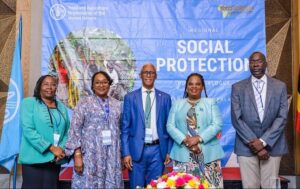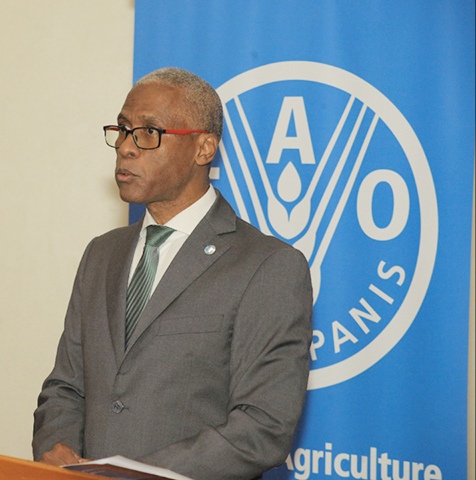By Felix Oketcho
Health experts and civil society activists across Africa have been urged to invest into social protection sectors to curb wide spread poverty in Africa.
Food and Agriculture Organisation Country Director Dr Antonio Querido says social protection is a crucial component of national development strategies for achieving inclusive and equitable growth.
“In real terms, social protection goes beyond safety net mechanisms to provide durable interventions that support the population to maintain a minimum acceptable level of consumption and a dignified life free of poverty, hunger, and deprivation of social necessities, “FAO Uganda Country Representative said.
Dr Antonio was officiating at the Regional Policy Dialogue on Social Protection conference in Kampala.

He alluded to the fact said that social protection is a core game-changer for the transformation of Uganda’s food systems and shock-responsive social protection for vulnerable farming households, access to agricultural resources and financing, as well as inclusive labor-saving technologies are necessary to reduce the gap in gender and youth inclusion in agriculture and food production.
“Making social protection a priority is particularly important since vulnerability and inequalities remain key development constraints in Uganda. While agriculture, forestry and fisheries are the third contributing factor to household income, the Uganda National Household Survey (UNHS) 2019/2020 indicated that 20.3% of the population were living in poverty and 39% still relying on the subsistence economy.”Atonio said.
He was however perturbed that despite attaining lower-middle-income status, approximately 26% of Ugandans, equivalent to over 8.3 million people, still live below the poverty line, while income inequality, with a Gini coefficient of 0.41, remains a prevalent issue.
Dr Antonio pledged FAO commitment to a pivotal role in linking social protection to agriculture and livelihoods by supporting governments and other stakeholders in establishing inclusive and sustainable social protection systems that synergize with agrifood systems and rural transformation strategies.
The Regional Universities Forum for Capacity Building in Agriculture (RUFORUM) Executive Secretary Patrick Okori noted that over 50% of Africa’s population depends on agriculture for their living, and the sector contributes approximately 35% of the continent’s GDP.
“The prospects for growth of Africa’s agriculture sector are immense, with studies showing that Africa’s food and agriculture market could increase from US$280 billion a year in 2023 to US$1 trillion by 2030, according to the African Development Bank.”Okori said.
He noted that the continent’s agricultural growth is the fastest growing sector across all continents, witnessing a 4.1% growth from 2000-2020 compared to 2.7% worldwide.
Okori expressed dismay over many African rural farming populations exposed climate-change and increased weather variability affecting their livelihood options.
According to him about 556 million people live in multidimensional poverty, 82 % of them staying in rural areas and mostly practicing various forms of agriculture.”
Dr. Haile-Gabriel Abebe Assistant Director-General and Regional Representative for Africa FAO Regional Office decried Africa’s failure is to achieve food security and nutrition targets of Sustainable Development Goal 2 as well as the Malabo targets of ending hunger and all forms of malnutrition by 2025.
“Recent estimates in 2022 reveal that approximately 282 million Africans representing about 20% of the population, were undernourished marking a stark increase of 57 million since the onset of the COVID-19 pandemic.”Abebe said.
“We must acknowledge the pervasive nature of poverty across our continent, particularly in rural areas. Despite significant advancements in agricultural production over the past two decades, the benefits of this growth have been unevenly distributed, leaving behind small-scale farmers and other vulnerable agri-food-dependent communities, thus exacerbating rural poverty,” he added.
Gender minister Betty Amongi Ongom expressed government efforts in addressing social protection challenges.
“Uganda upholds social protection as an inherent human right.It is thus our duty as government to ensure that all members of our society enjoy access to fundamental social protection benefits. These benefits encompass vital services such as healthcare, education, housing, income support, and other necessities, thereby facilitating dignified livelihoods.”Amongin said.
In 2015 Uganda approved the National Social Protection Policy which provides a framework for the implementation of social protection programmes in the country hence recognized social protection as a right.
Amongin envisions Uganda having a society where all individuals are secure and resilient to risks and shocks.
“In realization of this vision, the Government has focused on building a well-coordinated national social protection system for the provision of comprehensive and inclusive social protection provisions geared towards; Increasing access to social security; comprising direct income support and contributory social insurance, Enhancing care, protection and support for vulnerable people; and Strengthening the institutional framework for social protection service delivery.”
Amongi commended the work of FAO in supporting the expansion of social protection to rural population and agrifood system workers, including women, making up the majority of those living in poverty in Uganda and other countries in Africa.



